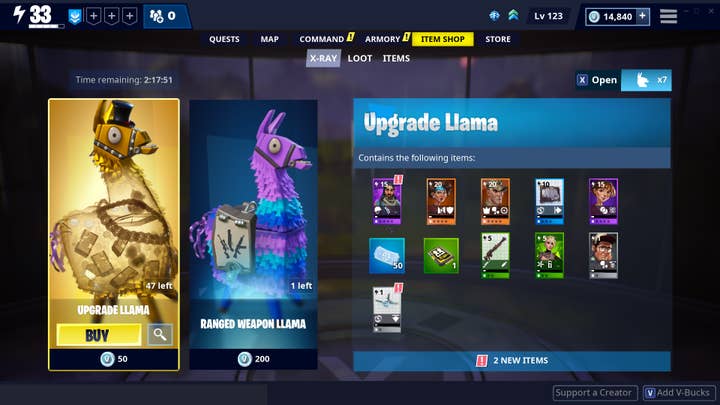California man sues Epic Games over "predatory" loot boxes
Complaint alleges Save the World's loot llamas were "like playing a slot machine"
A California man has filed a lawsuit this week against Epic Games on behalf of his son, alleging the company engaged in a "predatory scheme" with loot boxes in Fortnite.
Steve Altes, filing for "R.A," brought a complaint that focused only on the loot boxes, or "llamas" in the game's Save the World co-op mode, and not the battle royale mode. His primary concern is that these loot boxes are -- or were -- blind draws, and that said blind draws specifically targeted children with gambling-like mechanics.
Up until January of this year, there was no way to know what items would be inside before you purchased and opened a loot llama, and Epic Games did not disclose the odds. However, that changed in a recent update to the game that now shows the contents of loot llamas in Save the World before they are purchased with V-Bucks.
Though the lawsuit does not mention this (admittedly recent) change, it does focus on the ties between loot boxes and gambling, as well as the targeting of minors. The plaintiff alleges that Epic deliberately designed Save the World to hinder a player's progress if they didn't spend real money, and that Epic has "made a fortune on in-game purchases, preying in large part on minors who are especially susceptible to such predatory tactics." It also states that purchasing loot llamas is akin to "playing a slot machine."
"Players, and particularly minors, are lured into purchasing Llamas with the reasonable expectation that a purchase will result in better loot," the lawsuit reads. "Players are encouraged to keep purchasing Llamas with the reasonable belief that repeated purchase will lead to the chance of receiving better loot and therefore improvement in performance of the game. Through both express misrepresentations and omissions, Epic markets Llamas as highly likely to contain valuable loot that will increase a player's power and prowess in the Fortnite game. But in reality, Llamas do not contain the loot expected by the reasonable consumer."
The plaintiff's trouble is not only with the specific targeting of minors with apparent gambling mechanics, but also with Epic Games not disclosing the odds of getting rare items in each loot box. He alleges Epic deliberately tried to hide the fact that the odds are "next to nothing." Though the recent update showing loot box contents does negate the need to disclose odds in the same manner, Epic has not revealed what those odds originally were or are.
The lawsuit accuses Epic of violating California's Consumer Legal Remedies Act (protecting consumers from unfair business practices), False Advertising Law, and Unfair Competition Law, as well as accusing them of unjust enrichment. The plaintiff is requesting that the court prevent Epic from selling similar, odds-less loot boxes in the future, as well as declare such loot boxes unlawful, and refund the money the plaintiff spent on them in addition to damages and fees.
The suit also requests R.A. be appointed as a class representative in an effort to open up the complaint to a class action suit for anyone in the state of California who has purchased a loot llama within a certain period in the game's Save the World mode.

